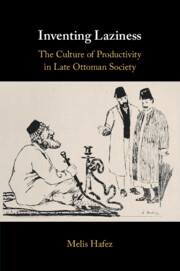Book contents
- Inventing Laziness
- Inventing Laziness
- Copyright page
- Contents
- Figures
- Preface
- Acknowledgments
- A Note on Translations and Transliteration
- Introduction
- 1 Moralizing Productivity in the Age of Reform
- 2 Criminalizing Laziness
- 3 Imagining Ottoman Dandies and Industrious Effendis
- 4 Militarizing the Productive Body
- 5 Exclusionism at Work
- Epilogue
- Bibliography
- Index
Introduction
Published online by Cambridge University Press: 10 December 2021
- Inventing Laziness
- Inventing Laziness
- Copyright page
- Contents
- Figures
- Preface
- Acknowledgments
- A Note on Translations and Transliteration
- Introduction
- 1 Moralizing Productivity in the Age of Reform
- 2 Criminalizing Laziness
- 3 Imagining Ottoman Dandies and Industrious Effendis
- 4 Militarizing the Productive Body
- 5 Exclusionism at Work
- Epilogue
- Bibliography
- Index
Summary
In 1843, just four years after the proclamation of the Imperial Edict of Gülhane, which launched the Ottoman Empire into a century of accelerated reform, an unsigned editorial appeared in Ceride-i Havadis, the first semi-official newspaper of the empire.1 The anonymous author stated that, despite the fact that the Ottoman realms possessed “the most pleasant weather, fertile lands, and a population smarter than other climatic zones,” the other regions, where, according to him, the weather is harsh (vahim), and people are stupid (gabi), were militarily victorious and much more productive.2 Perplexed and dismayed by this predicament, the author concluded that the Ottoman Empire’s economic and military weaknesses could be ascribed to “its people’s lack of effort and ardor (sa’y u gayret).” The author believed that the Ottomans wasted their lives in vain and raised their children in “utter laziness.” They neither helped themselves nor benefited their society (halkın işine yaramak).
- Type
- Chapter
- Information
- Inventing LazinessThe Culture of Productivity in Late Ottoman Society, pp. 1 - 34Publisher: Cambridge University PressPrint publication year: 2021

